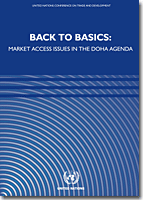
Broadly, this study shows that the elimination of tariffs is more important in improving the allocation of resources than is the elimination of export subsidies. Moreover, the elimination of export subsidies, if not coupled with tariff liberalization, may have negative effects on some regions, especially in Africa. Finally, extending liberalization to all merchandise trade would almost double world gains and would benefit developing countries in particular. However, the distribution of gains and losses from a comprehensive liberalization scenario would be unequal across different groups of developing countries. While most Asian countries would gain substantially if tariff cuts in manufacturing were added to liberalization in agriculture, sub-Saharan Africa might not.
Some of the more specific conclusions that may be useful in determining targets and modalities for the post-Doha market access negotiations in the WTO are:
- Both in agriculture and in industrial products, a formula approach would help address tariff peaks and tariff escalation. A formula approach is highly effective in this respect, but may be too much too soon for many developing countries, unless modulated in some way. Exceptions to a formula should be limited, and, perhaps, subject to a minimum cut for each tariff line. The focus should be on cutting higher tariff rates; eliminating low rates may appear administratively tidy, but can increase effective protection on processing. Percentage or ad valorem rates should be preferred in the interests of transparency, but if specific rates can help avoid resort to other forms of contingency protection, information on ad valorem equivalents should be published.
- Accelerated reductions in tariffs and other forms of support should be encouraged for exports of interest to the developing countries, especially the least developed countries (LDCs). Developing countries should be granted longer transition periods, with even greater periods for LDCs. Developing countries should not be required to fully reciprocate on agreed targets (by virtue of GATT Article XXVIII bis). Accelerated liberalization or full reciprocity by these countries might be rewarded with financial support, particularly to offset revenue losses and facilitate structural adjustment. Focusing tariff liberalization on bound rates will also allow some policy space for developing countries whose bound rates are higher than applied rates.
- Export subsidies and the existence of domestic supports, not technically part of market access negotiations, affect the conditions of market access and could be tackled by across-the-board reductions. The scope for transfers between products should be reduced or eliminated in order to ratchet down interventions.



